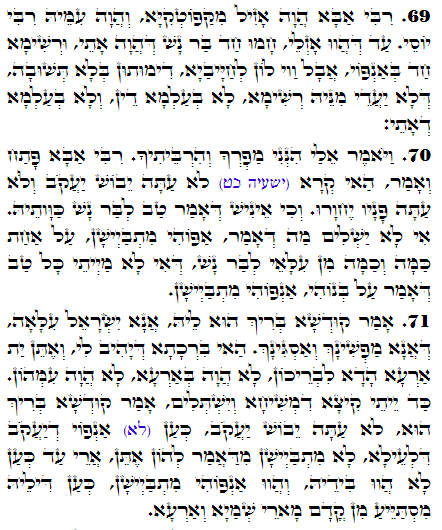Daily Zohar # 2915 – Vayechi – How to avoid the painful shame
Daily Zohar 2915
Daily Zohar 2915

.
Hebrew translation:
70. וַיֹּאמֶר אֵלַי הִנְנִי מַפְרְךָ וְהִרְבִּיתִךָ. רַבִּי אַבָּא פָּתַח וְאָמַר, פָּסוּק זֶה (ישעיה כט) לֹא עַתָּה יֵבוֹשׁ יַעֲקֹב וְלֹא עַתָּה פָּנָיו יֶחֱוָרוּ, וְכִי אִישׁ שֶׁאוֹמֵר טוֹב לְבֶן אָדָם כְּמוֹתוֹ, אִם לֹא יַשְׁלִים מַה שֶּׁאָמַר, פָּנָיו מִתְבַּיְּשׁוֹת, עַל אַחַת כַּמָּה וְכַמָּה מֵהָעֶלְיוֹנִים לִבְנֵי אָדָם, שֶׁאִם לֹא מֵבִיא כָּל טוֹב שֶׁאָמַר עַל בָּנָיו, פָּנָיו מִתְבַּיְּשׁוֹת.
71. אָמַר לוֹ הַקָּדוֹשׁ בָּרוּךְ הוּא, אֲנִי יִשְׂרָאֵל הָעֶלְיוֹן שֶׁאֲנִי מַרְבְּךָ וּמְגַדֶּלְךָ, הַבְּרָכָה הַזּוֹ שֶׁנָּתַן לִי, וְאֶתֵּן אֶרֶץ זוֹ לִבְנֵיכֶם לֹא הָיְתָה בָּאָרֶץ, לֹא הָיָה עִמָּם כְּשֶׁיָּבֹא קֵץ הַמָּשִׁיחַ וִיתֻקַּן. אָמַר הַקָּדוֹשׁ בָּרוּךְ הוּא, לֹא עַתָּה יֵבוֹשׁ יַעֲקֹב – כָּעֵת (לֹא) פְּנֵי יַעֲקֹב שֶׁלְּמַעְלָה לֹא מִתְבַּיְּשִׁים מִשֶּׁאָמַר לָהֶם אֶתֵּן, הֲרֵי עַד עַכְשָׁו לֹא הָיוּ בְיָדוֹ, וְהָיוּ פָנִים מְבֻיָּשׁוֹת. כָּעֵת שֶׁלּוֹ מִסְתַּיֵּעַ מִלִּפְנֵי רִבּוֹן הַשָּׁמַיִם וְהָאָרֶץ.
.
Zohar Vayechi
#69
While Rabbi Aba and Rabbi Yosei were walking from Kapotkiah, they saw a man with a special impression on his face. They say; woe to the wicked that die without repentance, teshuva, because this impression would not be removed from the face in this world or the next one.
#70
Isaiah 29:22
“לָכֵן כֹּה אָמַר יְהוָה אֶל בֵּית יַעֲקֹב אֲשֶׁר פָּדָה אֶת אַבְרָהָם לֹא עַתָּה יֵבוֹשׁ יַעֲקֹב וְלֹא עַתָּה פָּנָיו יֶחֱוָרוּ”
“Therefore, thus says YHVH, who redeemed Abraham, concerning the house of Jacob: “Jacob shall no more be ashamed, no more shall his face grow pale.”
A person who promises another something good and doesn’t make good on his promise, an impression of shame is marked on his face. Promises that come from God to bring benefits to his children would cause great shame in the upper levels if the promises are not fulfilled.
#71
Genesis 48:4
“וַיֹּאמֶר אֵלַי הִנְנִי מַפְרְךָ וְהִרְבִּיתִךָ וּנְתַתִּיךָ לִקְהַל עַמִּים וְנָתַתִּי אֶת הָאָרֶץ הַזֹּאת לְזַרְעֲךָ אַחֲרֶיךָ אֲחֻזַּת עוֹלָם”
“and said to me, ‘Behold, I will make you fruitful and multiply you, and I will make of you a company of peoples and will give this land to your offspring after you for an everlasting possession.’”
The Holy One Blessed be He promised and blessed Jacob and his offsprings to have the Land of Israel to be their everlasting possession. Now his children are in exile and the Holy Temple is not with them to draw the Light to the world. There is an aspect of shame present until the promises are kept.
When the end of the correction process comes to be with the kingdom of Mashiach, God’s promises will be fulfilled and there will be no more shame above or below. Before the final Tikun of the world, the promises couldn’t be fulfilled. After the coming of Mashiach, the earth and heavens would connect in equality and the flow of blessings would fulfill all promises, and “Jacob shall no more be ashamed” (Isaiah 29:22).
God’s promises are available for fulfillment the moment they were made. The only condition is that we need to have the proper vessel to receive the light of the fulfillment of that promise so it will manifest in this world. That is why God made a ‘backup’ plan to rescue us if we couldn’t complete the Tikun. He will send Mashiach to do the final ‘cleanup’, remove all negativities left in the world and restore the flow of blessings promised to us from the beginning.
The promises to Jacob weren’t fulfilled because he couldn’t make the proper ‘vessel’ for the promises. Because the promises were made to Jacob, the shame is on his face exists in the upper levels. Now we can understand the verse saying; “Jacob shall no more be ashamed”
Lesson;
The lessons from this Zohar are very deep and important. The entire Zohar about the Torah portion of Vayechi is about life and death, above and below.
People who experience death and attended the heavenly court felt a great and painful feeling of shame for all the inequities they did. The Torah and the precepts give us the light to correct and fulfill any lack that we may have in our souls. If we don’t make the corrections, our soul would stand ‘naked’ in the heavenly court after death and would feel great painful shame.
To avoid ‘shameful’ situations, we make efforts not to lose opportunities to study, do good, purify our vessels and correct our souls.
{||}

 Previous: Vayechi
Previous: Vayechi
